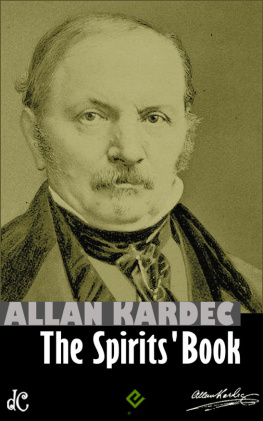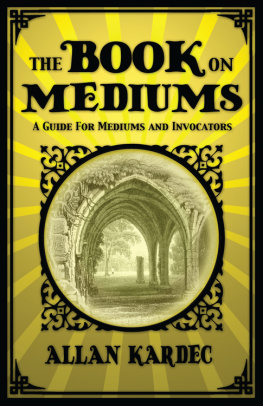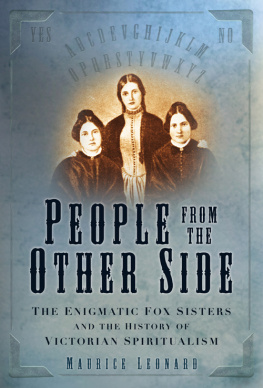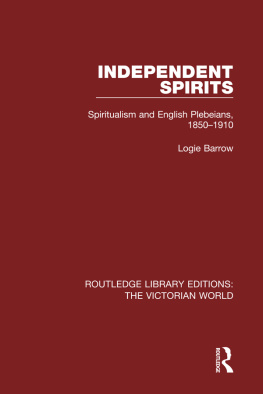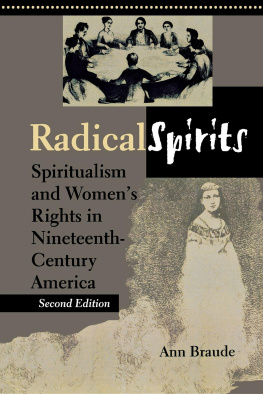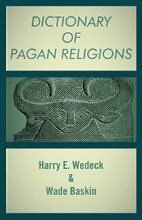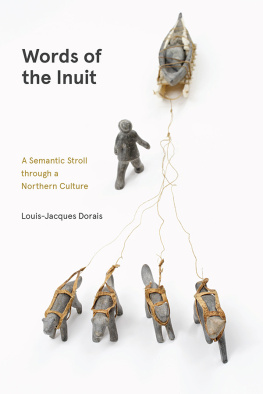THE SPIRITS' BOOK
Containing the principles of Spiritist Doctrine on the immortality of the soul: the nature of spirits and their relations with men; the moral law: the present life; the future life, and the destiny of the human race.
According to the teachings of spirits of high degree, transmitted through various mediums, collected and set in order by
Allan Kardec
Translated from the hundred and twentieth thousand by
Anna Blackwell
Contents
Translator's preface
In presenting to her countrymen a work which has long since obtained a wide acceptance on the Continent, the translator has thought that a brief notice of its author, and of the circumstances under which it was produced, might not be without interest for English readers.
Lon-Dnizarth-Hippolyte Rivail, better known by his nom de plume of Allan Kardec, was born at Lyons, on the 3rd of October 1804, of an old family of Bourg-en-Bresse, that had been for many generations honourably distinguished in the magistracy and at the bar. His father, like his grandfather, was a barrister of good standing and high character; his mother, remarkably beautiful, accomplished, elegant, and amiable, was the object, on his part, of a profound and worshipping affection, maintained unchanged throughout the whole of his life.
Educated at the Institution of Pestalozzi, at Yverdun (Canton de Vaud), he acquired at an early age the habit of investigation and the freedom of thought of which his later life was destined to furnish so striking an example. Endowed by nature with a passion for teaching, he devoted himself, from the age of fourteen, to aiding the studies of those of his schoolfellows who were less advanced than himself; while such was his fondness for botany, that he often spent an entire day among the mountains, walking twenty or thirty miles, with a wallet on his back, in search of specimens for his herbarium. Born in a Catholic country, but educated in a Protestant one, he began, while yet a mere boy, to meditate on the means of bringing about a unity of belief among the various Christian sects-a project of religious reform at which lie laboured in silence for many years, but necessarily without success, the elements of the desired solution not being at that time in his possession.
Having finished his studies at Yverdun, he returned to Lyons in 24, with the intention of devoting himself to the law; but various acts of religious intolerance to which he unexpectedly found himself subjected led him to renounce the idea of fitting himself for the bar, and to take up his abode in Paris, where he occupied himself for some time in translating Telemachus and other standard French books for youth into German. Having at length determined upon his career, he purchased, in 1828, a large and flourishing educational establishment for boys, and devoted himself to the work of teaching, for which, by his tastes and acquirements, he was peculiarly fitted. In 1830 he hired, at his own expense, a large hall in the Rue de Svres, and opened therein courses of gratuitous lectures on Chemistry, Physics, Comparative Anatomy, and Astronomy. These lectures, continued by him through a period of ten years, were highly successful, being attended by an auditory of over five hundred persons of every rank of society, many of whom have since attained to eminence in the scientific world.
Always desirous to render instruction attractive as well as profitable, he invented an ingenious method of computation, and constructed a mnemotechnic table of French history, for assisting students to remember the remarkable events and discoveries of each reign.
Of the numerous educational works published by him may be mentioned, A Plan for the' Improvement of Public Instruction . submitted by him in 1828 to the French Legislative Chamber, by which body it was highly extolled, though not acted upon; A Course of Practical and Theoretic Arithmetic , on the Pestalozzian System, for the use of Teachers and Mothers (1829); A Classical Grammar of the French Tongue (1831); A Manual for the use of Candidates for Examination in the Public Schools; with Explanatory Solutions of various Problems of Arithmetic and Geometry (1848); Normal Dictations for the Examinations of the Hotel de Ville and the Sorbonne, with Special Dictations on Orthographic Difficulties (1849) These works, highly esteemed at the time of their publication, are still in use in many French schools; and their author was bringing out new editions of some of them at the time of his death.
He was a member of several learned societies; among others, of the Royal Society of Arras, which, in 1831, awarded to him the Prize of Honour for a remarkable essay on the question, "What is the System of Study most in Harmony with the Needs of the Epoch?" He was for several years Secretary to the Phrenological Society of Paris, and took an active part in the labours of the Society of Magnetism, giving much time to the practical investigation of somnambulism, trance, clairvoyance, and the various other phenomena connected with the mesmeric action. This brief outline of his labours will suffice to show his mental activity, the variety of his knowledge, the eminently practical turn of his mind, and his constant endeavour to be useful to his fellow-men.
When, about 1850, the phenomenon of "table-turning" was exciting the attention of Europe and ushering in the other phenomena since known as "spiritist", he quickly divined the real nature of those phenomena, as evidence of the existence of an order of relationships hitherto suspected rather than known-viz., those which unite the visible and invisible worlds. Foreseeing the vast importance, to science and to religion, of such an extension of the field of human observation, he entered at once upon a careful investigation of the new phenomena. A friend of his had two daughters who had become what are now called "mediums." They were gay, lively, amiable girls, fond of society, dancing, and amusement, and habitually received, when "sitting" by themselves or with their young companions, "communications" in harmony with their worldly and somewhat frivolous disposition. But, to the surprise of all concerned, it was found that, whenever he was present, the messages transmitted through these young ladies were of a very grave and serious character; and on his inquiring of the invisible intelligences as to the cause of this change, he was told that "spirits of a much higher order than those who habitually communicated through the two young mediums came expressly for him, and would continue to do so, in order to enable him to fulfil an important religious mission."
Much astonished at so unlooked-for an announcement, he at once proceeded to test its truthfulness by drawing up a series of progressive questions in relation to the various problems of human life and the universe in which we find ourselves, and submitted them to his unseen interlocutors, receiving their answers to the same through the instrumentality of the two young mediums, who willingly consented to devote a couple of evenings every week to this purpose, and who thus obtained, through table-rapping and planchette-writing, the replies which have become the basis of the spiritist theory, and which they were as little capable of appreciating as of inventing.
When these conversations had been going on for nearly two years, he one day remarked to his wife, in reference to the unfolding of these views, which she had followed with intelligent sympathy: "It is a most curious thing! My conversations with the invisible intelligences have completely revolutionised my ideas and convictions. The instructions thus transmitted constitute an entirely new theory of human life, duty, and destiny, that appears to me to be perfectly rational and coherent, admirably lucid and consoling, and intensely interesting. I have a great mind to publish these conversations in a book; for it seems to me that what interests me so deeply might very likely prove interesting to others." His wife warmly approving the idea, he next submitted it to his unseen interlocutors, who replied in the usual way, that it was they who had suggested it to his mind, that their communications had been made to him, not for himself alone, but for the express purpose of being given to the world as he proposed to do, and that the time had now come for putting this plan into execution. "To the book in which you will embody our instructions," continued the communicating intelligences, "you will give, as being our work rather than yours, the title of Le Livre des Esprits ( The Spirits Book ); and you will publish it, not under your own name, but under the pseudonym of Allan Kardec. Keep your own name of Rivail for your own books already published; but take and keep the name we have now given you for the book you are about to publish by our order, and, in general, for all the work that you will have to do in the fulfilment of the mission which, as we have already told you, has been confided to you by Providence, and which will gradually open before you as you proceed in it under our guidance."
Next page
